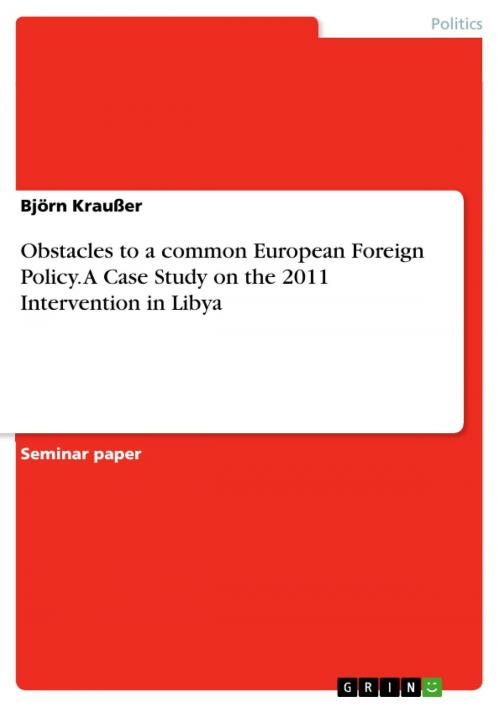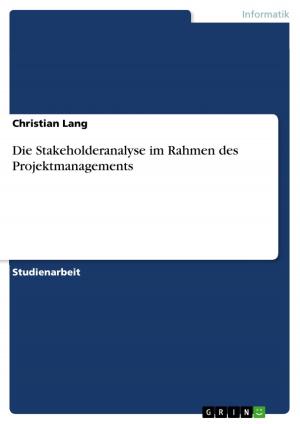Obstacles to a common European Foreign Policy. A Case Study on the 2011 Intervention in Libya
Nonfiction, Social & Cultural Studies, Political Science| Author: | Björn Kraußer | ISBN: | 9783668049499 |
| Publisher: | GRIN Verlag | Publication: | September 18, 2015 |
| Imprint: | GRIN Verlag | Language: | English |
| Author: | Björn Kraußer |
| ISBN: | 9783668049499 |
| Publisher: | GRIN Verlag |
| Publication: | September 18, 2015 |
| Imprint: | GRIN Verlag |
| Language: | English |
Seminar paper from the year 2014 in the subject Politics - International Politics - Topic: European Union, grade: 1,6, LMU Munich, course: European Foreign Policy, language: English, abstract: This paper aims to offer some insight into the problems that the EU's members have with harmonizing their foreign policies. The example of the 2011 Libya intervention is used in order to show some of the typical problems that appear with European foreign policy coordination. Since the end of the Cold War the EU has found itself in a position that asks for a redefinition of European foreign policy. The EU can no longer comfortably rely on US-American leadership in foreign and especially security policy. While the world is becoming increasingly multipolar with the rise of states such as China, India and Brazil the EU itself must also find a new role in this global system. With a population of 500 million and a GDP comparable to that of the USA, as well as high shares in world exports and imports the EU finds itself in relative close neighborhood to some more unstable regions. Additionally the EU's history has shown that the members of the Eu often face difficulties agreeing on common position and presenting themselves as the close unified community the EU aims to be. The EU's position as a global actor may be threatened in the future if it can not agree on a common foreign policy. Even though the need for a common foreign policy seems to be so obvious, the EU still has a long way to go to a truly unified foreign policy.
Seminar paper from the year 2014 in the subject Politics - International Politics - Topic: European Union, grade: 1,6, LMU Munich, course: European Foreign Policy, language: English, abstract: This paper aims to offer some insight into the problems that the EU's members have with harmonizing their foreign policies. The example of the 2011 Libya intervention is used in order to show some of the typical problems that appear with European foreign policy coordination. Since the end of the Cold War the EU has found itself in a position that asks for a redefinition of European foreign policy. The EU can no longer comfortably rely on US-American leadership in foreign and especially security policy. While the world is becoming increasingly multipolar with the rise of states such as China, India and Brazil the EU itself must also find a new role in this global system. With a population of 500 million and a GDP comparable to that of the USA, as well as high shares in world exports and imports the EU finds itself in relative close neighborhood to some more unstable regions. Additionally the EU's history has shown that the members of the Eu often face difficulties agreeing on common position and presenting themselves as the close unified community the EU aims to be. The EU's position as a global actor may be threatened in the future if it can not agree on a common foreign policy. Even though the need for a common foreign policy seems to be so obvious, the EU still has a long way to go to a truly unified foreign policy.















